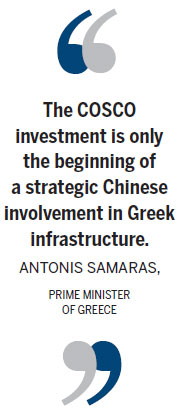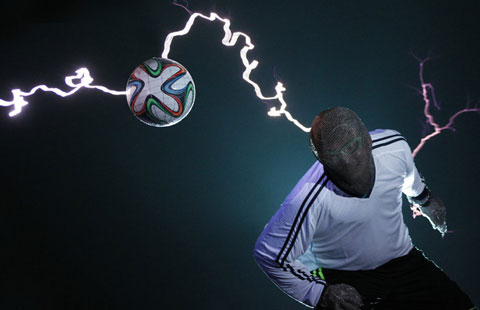'Gateway' into Europe from the east
Updated: 2014-06-20 08:11
By Fu Jing in Athens (China Daily Europe)
|
|||||||||||
|
Antonis Samaras, the prime minister of Greece, says he expects Premier Li Keqiang's visit to Greece will accelerate the process of infrastructure cooperation. Alkis Konstantinidis / Reuters |
Greek PM outlines his blueprint for continued economic recovery, with China at the heart of his plans
Antonis Samaras, the prime minister of Greece, says he considers China's 2009 investment in the Greek port of Piraeus "a game changer", and just the start of more Chinese investment which will help turn his country into a leading trade gateway into Europe.
COSCO, China's leading and the world's second-largest shipping company, spent 4.3 billion euros ($5.9 billion) on a 35-year management lease for the No 2 and No 3 piers at the port, which it has been operating since June 2010.
The state-owned COSCO was recently short-listed as a potential buyer of a majority 67 percent stake in Piraeus Port - the largest in Greece and among the top 10 container ports in Europe - in competition with four other international suitors.
"We are now building on this and trying to expand it further," Samaras told China Daily during an exclusive interview shortly before Chinese Premier Li Keqiang's three-day visit to Greece.
"The COSCO investment is only the beginning of a strategic Chinese involvement in Greek infrastructure, in the process of opening up a major 'European corridor'."
Li is paying a return visit to Greece from June 19 to June 21 after the Greek prime minister visited China last year, shortly after the Chinese premier took office.
Since his visit, Samaras says China and Greece have already made significant progress on infrastructure cooperation and he expects his Chinese counterpart's visit will now accelerate the process.
"We started a closer working relationship last year and we are advancing on projects which are not only mutually beneficial for both of us, but also for the European Union at large," he says.
The 63-year-old adds that Greece is perfectly positioned to be the "gateway" into Europe for international trade with the Far East and the Middle East, via the Suez Canal and the Mediterranean sea, and onto the markets of central and Eastern Europe, but concedes this still needs major infrastructure investment, possibly full privatization, of its railways and airport hubs.
He admits the privatization program of various state-owned Greek assets has made a slow start, due to initial regulatory hurdles, but it is gaining momentum.
But Greece has already had what he calls a "breakthrough" at Piraeus, where the pioneering investment by COSCO has proved a huge success.
"We have made a good start with Piraeus, and now there are plans to expand in many directions," he adds .

China and Greece, he says, have identified a number of areas of mutual interest and there is an ongoing process of discussing specific investment plans and trade agreements, and expanding cooperation.
"We are moving step by step, but are making tangible progress and building solid relations with enormous prospects for both countries," he adds with confidence.
In his eyes, the two nations have always enjoyed close economic, social and political ties, which are set to become stronger.
As well infrastructure projects, Samaras says various aspects of Greece's maritime industry - around 15 percent of the world's shipping fleet currently sails under a Greek flag - can benefit too from growing links with China, as can its tourism and food sectors.
He reminds that Greece is considered the home of the "Mediterranean diet", and is seeing huge growth in its food industry, dominated by exports of virgin olive oil, feta cheese, wine and herb products.
The Greek PM marks his second anniversary of taking office on June 20, and will be sharing his painful stories and promising prospects to Li Keqiang.
Just two short years ago, the economy of his country of just over 11 million people was on the verge of collapse, with debt spiraling out of control, and it was in danger of being forced out of the eurozone.
Social unrest was spilling onto its streets, unemployment was rocketing, but now Samaras says "all these calamities seem so distant".
He highlights how Greece produced a primary budget surplus last year, meaning it covered all of its government expenses, except for debt interest payments.
"By the end of next year, we are predicted to eliminate our budget deficit altogether, including our interest payments."
With its debt being reined in, Samaras says his country has halted what has been a prolonged recession, and predicts 2014 will be "the first year of recovery, after six consecutive years of a falling GDP".
"Our high levels of unemployment have already started falling for the first time in more than six years," he says, and the government has now targeted growth of 2.9 percent and 3.7 percent for 2015, 2016 respectively.
Samaras readily admits that two years ago Greece was considered the "weakest link" in the European Union and the most unstable spot in the Eastern Mediterranean - but says it has now managed to throw away both those unwanted labels.
"It has been two amazing years, an unprecedented turnaround. But it has also been two painful years, of unbelievable sacrifices by the Greek people," he adds.
Samaras says a number of countries stood by Greece during its troubles.
"China was one of them, and I cannot express how much we appreciate that and how grateful we feel."
He says both countries have shown strong cultural ties over many years, and that while the Greek civilization has dominated the West for millennia, the Chinese culture has dominated the East.
"By opening up our cultural relations, we are doing much more than bringing together two distant countries."
He now calls strengthening the commercial links between China and Europe the "bigger picture", and that every effort should be made to open up barriers, rather than close them.
He uses carefully chosen words to describe the strategic aspects of bilateral relations between the two ancient nations.
Greece can be a "gateway" between China and Europe, in terms of international trade; it represents a "European corridor", in terms of investment and long-term economic ties; but also it offers a "cultural window" to what are two of the world's oldest and most influential civilizations.
"The more we find out about each other, the more we understand ourselves. The more we read and discuss about our past, the more we are inspired for our future," he adds.
An economics graduate, and an MBA from Harvard, who won the Greek Teen Tennis Championship at the age of 17, Samaras is clearly proud of the history of his country.
He adds that the ancient philosophers Plato, Aristotle and Thucydides were not only the founding fathers of Greek cultural heritage, but an integral part of Western civilization too.
"Confucius, Lao-tse and Sun Tsu, are also an integral part of universal cultural heritage," he adds.
"There are striking similarities between our two countries, and the more we appreciate the unique experiences of these two pieces of historical treasure, we see how complementary in nature and universal they are in their potential."
fujing@chinadaily.com.cn
(China Daily European Weekly 06/20/2014 page32)
Today's Top News
Businesses look forward to visit
Classic Greece lures Chinese
Port a good example of China deal
Greek PM salutes 'a game changer'
Young at heart, and they love art
China's Arctic shipping shortcut
Evacuation plans made for Chinese workers in Iraq
Energy costs to hit $5.7t
Hot Topics
Lunar probe , China growth forecasts, Emission rules get tougher, China seen through 'colored lens', International board,
Editor's Picks

|

|

|

|

|

|






